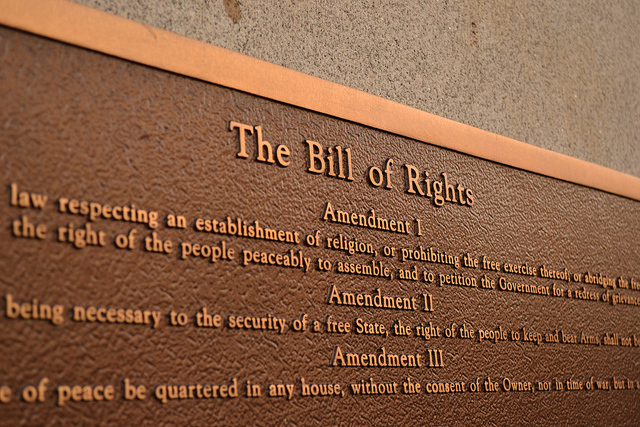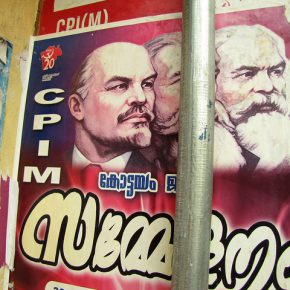The United States needs a new Bill of Rights. After the Revolutionary War ended, the aristocratic founders of the United States enacted a Constitution for the federal government. The document was brilliant in theory, but less so in practice. In 1789, a few founders decided that we needed a Bill of Rights to go along with the Constitution in order to set limits to government power.
The idea was to prevent a police state, to guarantee the right, as the Clash aptly put it, not to be killed. As recent developments are making increasingly clear, that hallowed document is no longer up to the task. That’s why a new Bill of Rights is required to more accurately reflect the current American condition. This is my tongue-in-cheek attempt to craft a more realistic one:
As the legitimacy of any system depends on the appearance of freedom, the inalienable right of the people to harmlessly assemble shall not be infringed; nor shall meaningless speech be abridged; nor shall the corporate-controlled media in any way be prohibited from fulfilling its vital role in the promotion of consumer capitalism. Those interested in making basic structural change, please send letter of intent and DNA sample to Stratfor Global.
Amendment, The Second
Though the U.S. government could destroy every one of its citizens with a push of a button, the fantasies of frustrated white men who blame the blacks and Mexicans for all their problems shall not be infringed, though this little illusion has resulted in the mass slaughter of our children.
Amendment, The Third
Today’s bygone relic is tomorrow’s reality: if the government needed soldiers to crash in your house, they would.
Though farfetched, the potential legal implications of an analogy between a soldier taking residence in a citizen’s home and the government cybersquatting a website could be explored.
Amendment, The Fourth
Socioeconomic considerations aside, i.e. the fact that the alleged rights described herein are highly dependent on where one resides on the financial spectrum, The Fourth Amendment does retain at least the minimal solidity of swiss cheese.
“The right of the people to be secure in their persons, houses, paper, effects…unreasonable searches and seizures, etc.”
If you are not black, if you are not Mexican, if you are not poor, if you do not live in an apartment…if you live in a house, if you are white, if you are wealthy so that it’s clear to the authorities that you can retain a private attorney…then the integrity of your privacy may not be invaded with impunity…unless a police officer gets something like a hunch, the Patriot Act is utilized or you are an American citizen subject to surveillance by the National Security Agency. In other words, the Fourth Amendment, in actuality, is now an empty formality.
Amendment, The Fifth
The Famous Fifth Amendment is not a right utilized by the defendant, but by the prosecutors who know “pleading the fifth” is roughly equivalent to hanging a guilty sign around the defendant’s neck. Note: when a right remains largely unchallenged and treated as inviolably sacred, then the beneficiary of that right is probably not the poor black kid from the ghetto.
Concerning another empty “right,” The Grand Jury is a procedure entirely owned and controlled by the prosecutor who would not be taking the charges to the Grand Jury if she did not subjectively believe that the defendant was guilty to begin with; moreover, in most jurisdictions the defendant has no right to speak on his own behalf to his fellow citizens on the Grand Jury, so that all the Grand Jury hears from prosecutors and cops who are personally invested in seeing the defendant made culpable for having the gall to demand all of his rights even if they are pro forma.
The Grand Jury “right” is the mechanism by which the state or government destroys the life of an innocent — remember, innocent until proven guilty — forcing that person to live with the crushing burden of felony charges so that the defendant often, whether actually guilty or not, is coerced into making a plea deal just to get himself out from under the terrible situation. This is the reality of due process of the Fifth Amendment.
And as far as double jeopardy is concerned — another empty “right”— the state can charge a citizen with one crime, then when the citizen is proven innocent of that crime, the state can charge her with a similar crime, then when the citizen is proven innocent of that crime, the U.S. government can charge her with a similar federal crime, meanwhile, both state and federal government can seize all of the defendant’s property without even so much as a trial. The Fifth Amendment is an absurdity, an empty hole, made intentionally famous for the purpose of persuading a public that they have rights, such as, “I take the Fifth…” and the police quietly laugh to themselves.
Amendment, The Sixth
In all criminal prosecutions, the accused shall enjoy the “right” to an indeterminate period of incarceration where she will have to sit in county jail, often for two or three years, before the docket grants her right to a day in court. The “right to a speedy trial,” a motion that has not been granted since 1666 in England, shall be filed in the original packet of defense motions so that it may be immediately ignored. The purpose of bail is solely to ensure that the defendant appears at the next court date, but for the purposes of our system, bail shall be excessively set so that in effect it is used to incarcerate the usually poor defendant without, again, ever having achieved a guilty verdict. The presumption of innocence shall go out the window as the country develops a need to incarcerate indigent people (at a rate higher than any other country in the world).
Nota bene. The Bill of Rights is an economic document whose genius exists in creating the illusion of freedom, while the economic strata devolves to pre-Daniel Shays levels (Shays, a revolutionary war hero, laid low and destroyed by banker aristocrats).
Amendment, The Seventh
The right to sue in civil court shall be memorialized as the preferred means of the oligarchy for handling its disputes. However, when the commoner begins to utilize this right — especially to sue the oligarchy — then limitations shall be placed on the right to sue, so that our courts do not become overly consumed with commoners’ attempts to monetarily redress the injuries that have been done to them.
After all, the trial lawyers, and not corporations, are to blame for national ills. The job creators must be given the widest possible berth and furthermore must not in any way be distracted by concerns for the health and welfare of the commoner employee or consumer. All good faith efforts shall be made to ensure the safety and security of the ownership class that has carried and maintained our nation, under God, through the storms and battlements of history.
There shall thenceforth be held, in lieu of Labor day, a Plutocracy Day in which commoners give thanks and pay homage for all that has been done for them by the aristocratic ownership of this land. This day shall be commemorated by the following: the dismissal of all lawsuits against any member of the ruling class and a “slave day” in which all commoners serve the elites as in the Virginian fields of the slaveholding humanitarian Founders of this Republic.
Amendment, the Eighth
Torture a human being with road salt for forty-five minutes, and that’s not cruel and unusual punishment. Throw a seventeen-year-old into solitary confinement for fifteen years “because we owe it to him.” Set million dollar bails for people who make minimum wage at the Texaco. Seize property, take everything, then garnish Mom’s wages and let the kids starve, then arrest the kids for some minor violation that they can’t pay the fine for because there is no money and let them spend their remaining juvenile years in a prison camp with little or no educational services or, better yet, one of those military-style boot camps where an angry bureaucratic testicle in an army costume gets to scream at him every day at 4 in the morning because anything having to do with the military in America is a social good.
We are a barbaric nation that is tripping over its homeless to become more and more barbaric all the time. Texas itself is in chronic violation of the Eighth Amendment, but come on, they’re good people down there, Willie and Waylon, Tony Romo, and the National Guard guarding our borders, making it so that the scourge from down south cannot penetrate the land of the free and the home of the brave, like Korematsu, Guantanamo, and the unofficial — or just ignored — prison camps that exist all over the country where a deregulated and economically incentivized prison-industrial complex is seen as economic progress. The United States, as it lives and breathes, is cruel and unusual in what it forces people to be in order just to survive.
Amendment, The Ninth
“The enumeration in the constitution, of certain rights, shall not be construed to deny or disparage others retained by the people.”
Note the wealth of Ninth Amendment jurisprudence. Note the landmark Supreme Court decisions that have brought this founding tenet into the mainstream of our society, thus giving birth to a democratic right of the people that shall be infringed. That this Bill of Rights shall not limit the type of society that we determine to have in order to reflect the contemporary need for justice, the evolution of our understanding, and the redefining of ourselves.
In truth, it is by this Ninth Amendment that the Founders have given us the gift of self-determination, mindful that a document written at one point in history could very well not meet the demands of another epoch, so that a nation’s constitution would remain fluid, adaptable, representative of a changing people’s will and in dialogue with the shifting demands of time. For no one understood better than our Founding Fathers — truly — that oppression arises where rights remain static, that those self-same rights become the tools of the elite, a means by which to consolidate power. Yes, we thank our leaders, our representatives, our justices for the vitality, dynamism, and living breathing strength of our Ninth Amendment.
Amendment, The Tenth
Despite the manner in which states’ rights have been manipulated to enslave blacks, deny women’s rights, and preserve the God-given splendor of white American male control, let’s end on a high note:
Western states, in their pragmatic sense of freedom, have utilized the Tenth to legalize marijuana, which whatever we make of these founding documents, goes to prove that they can be used toward the achievement of greater freedom. These are not technical words written in stone, but poetry open to fluidity and interpretation, born of not merely violent, but philosophical revolutions.
Photograph courtesy of Ted Mielczarek, published under a Creative Commons License





